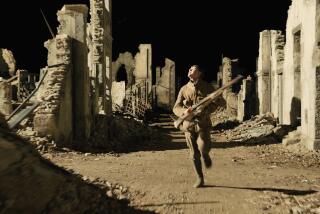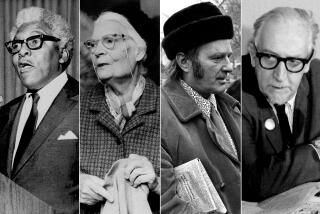Book Review: ‘To End All Wars’
- Share via
To End All Wars
A Story of Loyalty and Rebellion, 1914-1918
Adam Hochschild
Houghton Mifflin Harcourt: 450 pp., $28
We think of Europe in 1914 as a continent all too eager for war — volunteers jamming recruiting offices, festooned soldiers joyfully marching to battle and delirious crowds waving them off. To a significant extent, that vision is true, and for a time the Great War brought domestic unity and shared purpose to European nations deeply divided by class, gender and politics. In the euphoria of what everyone from emperors to foot soldiers believed would be a short, glorious and cleansing war that, in the Social Darwinism of the age, could only make Europeans more fit, came an overriding sense of purpose.
In “To End All Wars: A Story of Loyalty and Rebellion, 1914-1918,” Adam Hochschild challenges this image of the European home front. In this beautifully written and compellingly narrated story of Britain at war, Hochschild forces us to think about the Great War from the dual perspectives of those who prosecuted it and those who decried it. His primary focus is on well-known “divided families,” such as that of John French, hero of the Boer War, first commander in chief of the British Expeditionary Forces and last viceroy of Ireland, and his sister Charlotte Despard, militant suffragette, Labour Party activist, antiwar activist and, later, Sinn Fein member. As French ordered British soldiers through enemy fire and poison gas at the battles of Ypres and Loos, Despard sat in Holloway Prison on reduced rations and under the British prison code of silence. Despite each hating the cause represented by the other, French and Despard remained close until French became viceroy of Ireland and imprisoned his sister’s comrades-in-arms in 1918.
Focusing on the antiwar dissenters, the prescient ones who sensed the great tragedy at hand, Hochschild brings us the famous, such as mathematician, philosopher and patrician Bertrand Russell, and little-known conscientious objectors such as Fenner Brockway. The Pankhurstfamily that represented the women’s suffrage movement in Britain, was ripped apart by the war. Sylvia Pankhurst, as of 1914 as much a socialist as a feminist, resolved to “speak more urgently for peace.” Her mother, Emmeline, and sister Cristabel became zealous patriots, supporting crown and country and going from being force-fed in prison before the war to government-sponsored pro-war speaking tours. Through the gripping personal stories of socialists, Labour Party dissenters, conscientious objectors, dissident suffragettes and their often lonely and dangerous work of protest, underground newspapers and long prison sentences, Hochschild resurrects some of history’s forgotten heroes.
“To End All Wars” is also a history of war itself and covers the main events of the conflict, from the battles on the western front to the Russian Revolution. The lengthy battlefield descriptions, while moving, do detract from Hochschild’s gripping central characters because, more than anything else, this is a book about the clash of worldviews within British society. “To End All Wars” wants the reader to see the rush to war and the inability to stop it as the product of entrenched mind-sets. Hochschild foregrounds the work of those few who opposed the war and compares them with the deeply embedded commitment to war and empire of the war makers and the majority of the population.
Commanders at the front, such as French and Douglas Haig, and politicians and propagandists at home, such as Rudyard Kipling, saw the war through the joint lens of sport and empire. British commanders in the First World War — French and Haig are Hochschild’s primary cases — were shaped by the battles to enlarge and defend the British Empire, especially the Boer War. The fantasy of an “abiding, benevolent British Empire” lay at the center of their lives. They held fast to the idea of the cavalry as the primary weapon of war, completely in denial that “war was now an industrial process.” Despite lessons from the American Civil War and the Russo-Japanese War, British commanders and strategists failed to understand how the machine gun, poison gas and barbed wire had changed the face of war and had made individual skill nearly irrelevant.
With this sweeping and emotional book, Hochschild adds to his body of engaging and critical histories that include the prize-winning “King Leopold’s Ghost” and “Bury the Chains,” powerful works on the terrors of imperialism in Africa and the struggles of the British abolitionist movement. Hochschild likes tough subjects of continued moral relevancy. The senseless slaughter of a generation of young men, the moldy, rat-infested trenches that ripped across the continent, the end of ancient dynasties and the birth of ideologies that would lead to even greater death and destruction within a generation frame Hochschild’s discussion of “loyalty and rebellion.”
Hochschild has written a profound critique of industrial modern war and a celebration of individual dissent. Using World War I as a cautionary tale, he warns us against naïve patriotism, entrenched elites fighting a war to preserve their own power, myopic self-enclosed military cultures and the attraction of violence abroad as a diversion for problems at home. Much of this strikes a contemporary chord and, ultimately, through retelling the tragic deaths of a generation of European young men, Hochschild asks us to question the motivations behind war — because the solution can be so much worse than the problem.
Stone is a professor of history at Occidental College and an historian of modern Europe.
More to Read
Sign up for our Book Club newsletter
Get the latest news, events and more from the Los Angeles Times Book Club, and help us get L.A. reading and talking.
You may occasionally receive promotional content from the Los Angeles Times.










